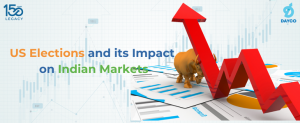What Does Trumps Win Mean for Your Portfolio
![]() November 8, 2024
November 8, 2024
![]() 0 Comments
0 Comments
The new term of Donald Trump would change the world markets, impacting the Indian markets subsequently. Since most of his policies related to trade, industry, and immigration, which were implemented earlier, might make a comeback as Trump enters his second term, those will influence how different sectors of India will perform. You must know what move will alter market behavior in the short term and which will change the economic fundamentals in the long term. Here, we break down the main advantages and disadvantages of a Trump win, tracing how each might shape your investments.
Positive Impact of Donald Trump’s Win On The Indian Stock Market and Indian Investors
- Export Opportunities for Key Sectors A significant advantage of a Trump presidency could come from increased tariffs on Chinese imports, potentially creating an export boost for Indian sectors like electronics, auto ancillaries, solar panels, and chemicals. If Trump doubles down on his protectionist trade policies, particularly towards China, US companies may start looking to other nations for imports. This could provide an opening for Indian firms to become competitive alternatives in the US market.
- Lower Commodity Prices Benefit Energy Companies Another impact of Trump’s policies could be the continuation of lower commodity prices. With Trump’s support for fossil fuels and his skepticism of clean energy mandates, oil and gas production in the US might increase, putting downward pressure on global commodity prices. Additionally, if tensions with China keep Chinese demand growth low, this could further support lower commodity costs.
- Boost for Industrial and Defense Sectors Trump’s commitment to transforming the US into a global manufacturing powerhouse could bolster multinational industrial companies with significant operations in India. As Trump seeks to shore up manufacturing infrastructure, these companies may play a larger role, and with that, the sectors they operate in, such as power, industrial automation, and defense, could also receive a boost. If Trump manages to reduce global supply chain tensions, Indian companies dependent on imports may benefit from smoother supply chains.
- Pro-Business Policies Favorable for Indian Equities Trump is known for his pro-business stance, typically favoring lower corporate taxes and deregulation. This could indirectly benefit Indian equities, especially those exposed to the US market or US-influenced sectors. Reduced regulation and lower corporate taxes in the US can create a more vibrant global economic environment, and India’s stock market could see a ripple effect, particularly if corporate growth and exports to the US increase.
Negative Impact of Donald Trump’s Win On The Indian Stock Market and Indian Investors
- Rising Inflationary Pressures On the downside, Trump’s policies could bring inflationary pressures, impacting costs and interest rates worldwide. If the US reimposes tariffs and initiates new restrictions on imports, inflation could spike due to increased production costs. For Indian companies that rely on US imports, this could raise expenses, impacting margins. Higher interest rates globally could also affect Indian borrowers, particularly companies needing US raw materials or capital.
For instance, Indian manufacturers using US-based equipment might face higher import costs, impacting their bottom lines. Investors with portfolios in sectors heavily reliant on imported goods may want to monitor these developments and consider potential hedging options.
- Strong Dollar and Its Implications A Trump presidency might bring a stronger dollar due to anticipated tax cuts and fiscal stimulus in the US, which could attract foreign investments. While a strong dollar might be beneficial for US companies, it could challenge India by putting pressure on the rupee. When the dollar strengthens, Indian investors may see a depreciation of the rupee, making imports more expensive and increasing inflationary pressures, especially for crude oil—a crucial import for India. This currency pressure could impact sectors heavily reliant on dollar-denominated imports, such as energy and technology.
- Market Volatility and Uncertain Policy Shifts Although a Trump win may trigger an initial rally in certain stocks, his unpredictable policies could create long-term market volatility. In his first term, the US markets performed well under Trump, with the Nasdaq outpacing the Nifty. However, volatility often accompanied his policies, which could continue into a second term, creating an unpredictable investment environment.
- Potential Restrictions on Immigration and Trade with India Trump’s stance on immigration could impact the Indian IT sector, a significant contributor to the country’s GDP and a favorite among investors. While India’s IT firms have made strides in hiring locally in the US, any new immigration restrictions might still disrupt staffing and increase costs. Although the impact could be more manageable than in his previous term, investors with exposure to IT stocks should remain vigilant.
Trade tensions might also rise, with Trump likely to push for reciprocal tariffs with countries imposing higher tariffs on the US. Given India’s reliance on the US for its IT, pharma, and textile exports, any such policy shift could affect these sectors’ profitability. You should keep a close watch on these trade policies and possibly diversify your holdings to mitigate potential impacts on these industries.
Mixed Reactions In The IT Sector:
As far as the Indian IT sector is concerned, experts are divided into two groups. One group is worried about Trump’s previous restrictions on H1B Visa. If his stance remains the same, it could negatively impact the Indian IT companies operating in the US. However, another group of experts are of the opinion that the Indian IT companies have already reduced their reliance on H1B Visa holders. These companies are likely to gain from Trump’s pro business stance.
In summary, a Trump win offers a mix of potential benefits and risks for Indian investors. While opportunities in export-oriented and energy-related sectors might look appealing, challenges in areas like inflation, currency stability, and market volatility cannot be ignored. With the possibility of inflationary pressures and a strong dollar impacting sectors across the board, you might find it beneficial to maintain a diversified portfolio, balancing growth sectors with more stable investments.
-Debraj Guhathakurata
Share With
I'm a cool paragraph that lives inside of an even cooler modal. Wins!
Are you sure?
In case you didnt know, you can open your account online within 24 hours. Offline account opening takes up to 4 working days. If you wish to open your account offline, fill and sign the forms using a black/blue ballpoint pen. Please fill in the email and mobile number of the applicant to avoid account opening delays.
Enter Password
Please enter your details and password
New to Dayco?
Enter Password
Please enter your details and password
New to Dayco?
Filing Complaints on SCORES (SEBI) – Easy & Quick
- Register on SCORES Portal (SEBI)
- Mandatory details for filing complaints on SCORES:
- Name, PAN, Address, Mobile Number, E-mail ID
- Benifits:
- Effective Communication
- Speedy redressal of the grievances
Thanks !!
Your details were successfully received.

Thank you for Your Feedback!
Our Team is working constantly on improving our user experience and your feedback really means a lot.
Thanks !!
App Link Send to your mobile number successfully.
Thank You
All your Questions have been recorded
Thank You
All your Questions have been recorded
Thank You!
Thank you for your response. We'll get in touch with you at the earlisest for your investment planning needs
NEXT
Thank You!
Thank You for your interest in our Moderate Equity Portfolio. Please find below the credentials to track this portfolio:
User ID: mockmod@daycoindia.com
Password: abcd@1234
Portfolio Tracker
Please Read!
Risk profiling is crucial for identifying and managing potential risks in investment decisions. Please carry out your risk profiling before making any investment decisions.
Complete Risk Assessment Now
Thank You !!
Please enter your details to download/print the report
Thank You !!
Please enter your details to download/print the report
Thank You !!
Please enter your details to download/print the report
Thank You !!
Please enter your details to download/print the report
Thank You !!
Please enter your details to download/print the report
Set Your Goal
Please Select an option from below
Set Your Goal
Please Select an option from below
Thanks You !
We appreciate your interest in our services. Our team will be in touch with you shortly.
CloseSet your Goal
Please enter your details in the fields provided
Thanks You!!
Calculation report has been sent to your mail id successfully
Clear form?
This will remove your answers from all questions and cannot be undone.



 Book Appointment
Book Appointment









Leave a Reply